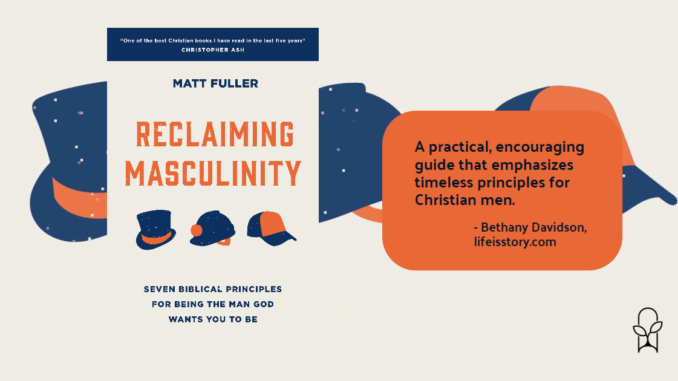
Also by this author: Be True to Yourself
Published by Good Book Company on June 1, 2023
Genres: Non-Fiction, Christian Life, Marriage, Parenting, Theology, Work
Goodreads

A positive and biblical vision of what it means to be a man.
In a world where masculinity is often associated with toxicity, what does it mean to "be a man"?
In a straightforward and empathetic way, Matt Fuller gets beyond cultural confusion and stereotypes as he examines what the Bible says is distinctive about being a man. He outlines a positive vision of biblical masculinity and shows what that might look like in real life today. Men will be encouraged to be sacrificial when leading, to work hard, and to protect and invest in others.
Whatever your personality and interests―whether you would rather skin a rabbit, read a book, or remodel your house―this book will give you confidence and direction to be the man God wants you to be.
This thoughtful, nuanced guide to a contentious topic will appeal to Christian men and some women who want to rethink masculinity in light of cultural controversy. This book is pretty basic, but it covers a lot of important topics about what it means to be a godly man, and Matt Fuller shares helpful insights without being overly prescriptive or getting into the weeds of highly specific debates. Fuller explores some passages and general themes from Scripture alongside current social discourse, highlighting timeless principles about what it means to be a man while also delving into contemporary issues.
I particularly appreciated his nuanced take on the fear and anxiety some women feel about men. Fuller acknowledges that it’s very difficult when someone thinks less of you because you’re a man, treating you as if you’re guilty until proven innocent, but he also validates why many women are so suspicious of men, encouraging his readers to have compassion for the kinds of bad experiences shaping such negative views. This is just one of many examples of how he handles contentious topics with care, validating women’s trauma without shutting down and belittling men in the way I’ve seen it done again and again.
Fuller writes about some of the challenges that men face when trying to define and understand masculinity, and throughout this book, he focuses on core principles from the Bible that apply regardless of a man’s time period, cultural background, or life stage. He gives examples of generational differences that can create conflict between older and younger men, and he emphasizes how important it is to focus on godly character traits above and beyond specific cultural practices. Fuller writes with nuance, vulnerability, and understanding, and the book feels like an honest exploration of things he’s walked through himself. I also appreciated his British humor, and his care to keep saying “in general” instead of making sweeping statements.
This book will mainly appeal to social and theological conservatives, but it’s less preachy and less restrictive than some similar books I’ve encountered, providing lots of room for different practical expressions of core beliefs. I particularly appreciated Fuller’s attention to single guys, and when he writes about marriage and fatherhood, it is never with the assumption that these relationships are integral to being a true man. He includes practical applications for men in different stages of life, and although some chapters apply to both men and women, others are specific to being a man in the world. I frequently read books written for men and relate to them deeply, and it was honestly kind of refreshing that so much of this didn’t apply to me, since that meant the author was going beyond personality traits and life experiences.
Reclaiming Masculinity: Seven Biblical Principles for Being the Man God Wants You to Be will be an encouraging read for many Christian men who want to better understand and articulate a vision of what it means to be a man, without relying on outdated stereotypes or tearing down masculinity. Because of Fuller’s attention to generational differences between men, this could be a particularly useful book for dads and sons to read together, and for men in different life stages to read as a group. Even though this book is fairly basic, the author’s nuance and varied practical examples will make this a great discussion-starter that lots of men can relate to, regardless of their life stage or different points of disagreement.
